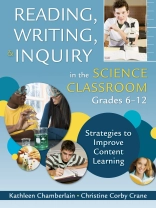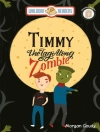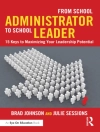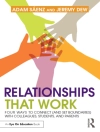‘The strategies align with what our preservice and veteran teachers need to teach in today′s classrooms. From newspapers, magazines, and research reports to adolescent trade books, the authors offer numerous strategies for supplementing science classes with various reading materials.’
—Amy M. Rogers, Instructor of Education
Lycoming College, Williamsport, PA
Combine literacy and inquiry-based instruction to advance student achievement in science!
Integrating reading and writing with inquiry in the science classroom can present a challenge for teachers who may not have a background in reading instruction and who may be concerned about how to strengthen students′ literacy skills while effectively teaching science content.
In this timely resource, Kathleen Chamberlain and Christine Corby Crane demonstrate how nurturing strong communication skills can have a significant impact on student performance, and provide research-based strategies for successfully integrating literacy skills with science instruction. Packed with information about reading and writing pedagogy, science standards, adolescent and young adult literature, and lesson design, this book:
- Addresses the relationship between reading and science education, including the use of textbooks and other materials
- Offers methods for teaching writing in the science classroom
- Highlights the role of technology in enhancing students′ science knowledge
- Includes sample lesson plans, graphic organizers, and templates suitable for any secondary science classroom, with modifications for students with special needs
The ultimate blend of theory and practice, Reading, Writing, and Inquiry in the Science Classroom, Grades 6–12 helps educators foster the skills to communicate science ideas and experiences and give students an academic advantage.
Mục lục
List of Figures
Preface
Acknowledgments
About the Authors
1. Constructing a Scientifically Literate Society
What Is Science?
What Is Scientific Literacy?
How Do We Reach Scientific Literacy?
Classroom Strategies
Questioning
Inquiry Teaching Models
5E Lesson Design
Generative Learning Model
Assessing Inquiry
Standards
Summary
2. Textbooks in the Science Classroom
Quality and Appropriateness of Textbooks
Readability of Texts
Students’ Reading Abilities
Matching Texts and Students
Other Considerations for Textbook Evaluations
Strategies for Using Textbook Materials
Pre-Reading Activities
Vocabulary Development
Setting a Purpose for Reading
During Reading
Post-Reading Activities
Summary
3. Beyond the Textbook
Literature for Adolescents
Genres of Trade Books
Children’s Books
Comic Books and Graphic Novels
Poetry
Nursery Rhymes and Children’s Songs
Newspapers and Popular Magazines
Book Talks
Literature Circles
Summary
Books for Science
Selected Trade Books Mentioned in This Chapter
Web Sites Referenced
4. Writing in Science
Why Writing?
Types of Writing
Informal Writing Tasks
Formal Writing Tasks
Formal Scientific Writing
Formal Creative Writing Tasks
Assessing Students’ Work
Creating the Environment
Summary
5. Using Technology to Enhance Reading, Writing, and Inquiry
Why Use Technology?
Getting Started
Hypermedia
Geocaching
Using the Internet
Webquests
Streaming Video
The Globe Program
Project Feeder Watch
Course Management Systems
Other Equipment
Digital Cameras
Handheld Computers
Data Analysis Programs
Databases
Spreadsheets
Technology and Writing
Inspiration
Claymation
Visual Communicator
Evaluating Software Programs
Challenges
Summary
Sources for Computer Programs Referenced in This Chapter
Web Sites Referenced in This Chapter
Additional Web Sites of Interest
References
Index
Giới thiệu về tác giả
Christine Corby Crane recently retired after a 26-year teaching career from the Athens Area School District in Athens, Pennsylvania, where she was the K-12 Science Department chair for nine years. She was instrumental in the district obtaining PA Environment and Ecology Exemplary Status for the 2007 school year after obtaining three grants to develop and implement a curriculum involving the Chesapeake Bay Watershed. In addition to teaching in Athens, she was an associate professor for Mansfield University, teaching science and technology methods courses. She has also taught K-12 science education courses for Penn State University. Crane has been a consultant for several federal, state, and community science education programs. She contributed to the Pennsylvania Department of Energy Elementary Energy and Environment Science Activities, Volume VI, and she is also the coauthor of a journal article, “Middle School Students Perceptions on How They Learn Science: Support for Inquiry-Based Classrooms.” She conducts workshops and presentations on teaching science and teaches undergraduate courses and graduate science education courses as an adjunct professor at local colleges. She received her doctorate in curriculum and instruction from Pennsylvania State University, where she focused on science education and language and literacy. A graduate of Elmira College, she earned her master’s of science degree from Mansfield University of Pennsylvania.












